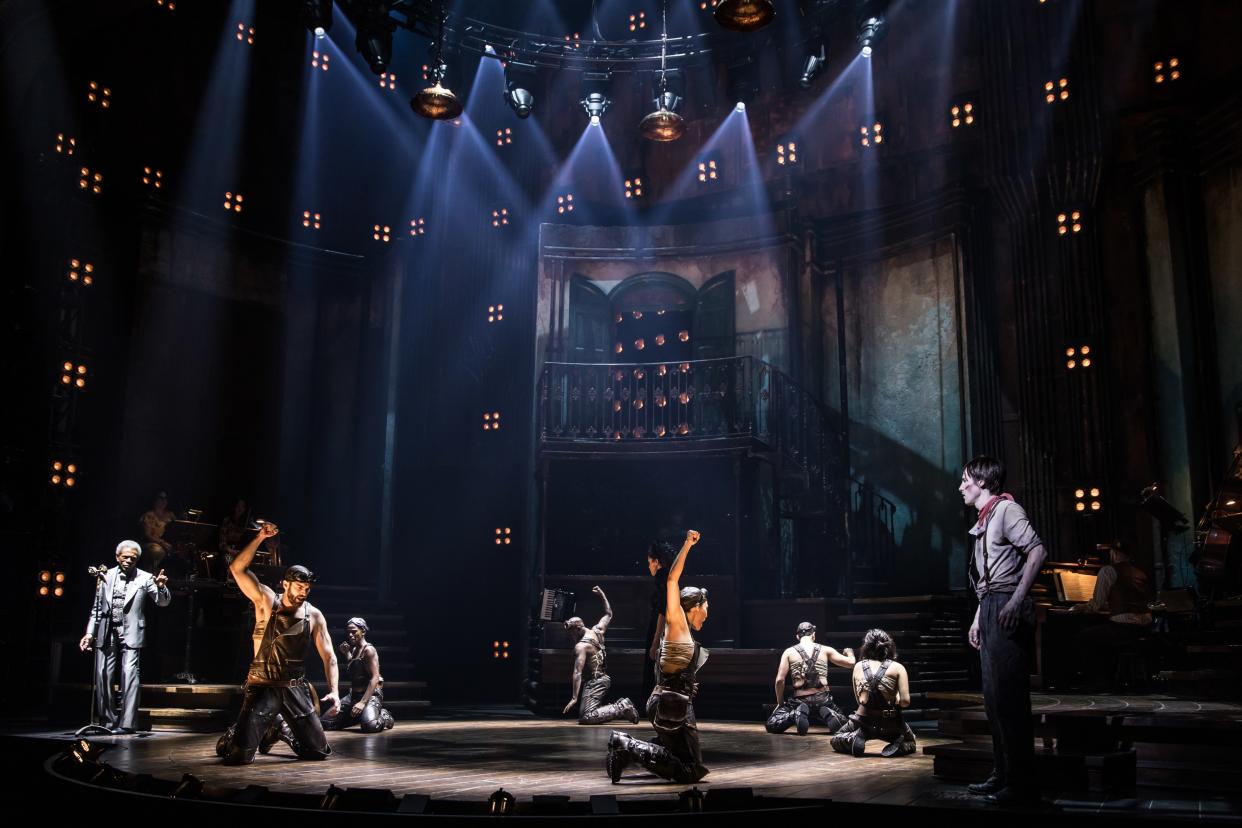The Liberating, Radical Politics of Hadestown

I wanted to see Hadestown as soon as I heard, in the world of this musical, that hell is a factory floor. A strange, steamy workshop in which workers toil to make cars, mine coal, and also, somehow, do something with crude oil, an amalgam of the worst profit-making, earth-devouring commodities that are the scourge of this planet. Doesn't all that just make you want to burst out in song?
I've been weary of political musicals ever since a certain retelling of a Founding Father's life became shorthand for extremely boring, self-congratulatory liberal politics—and still costs at least three digits to see. Hadestown, on the other hand, takes place not during the birth of this world we're in but at the end of it, which feels, unfortunately, much more appropriate to the times we're in.
Hadestown is also a retelling, of a Greek myth rather than an American one: the tragedy of Orpheus and Eurydice. In the original story, Orpheus, the lyre player who has the power to animate the flowers and the rivers, marries beautiful wood nymph Eurydice, who suddenly dies. When she travels to the Underworld, Orpheus tries to retrieve her, but encounters its overseer, King Hades. Hades allows the lovers to leave but only if Orpheus leads Eurydice up to the living world without looking back at her. He does; she dies, again. (No spoilers, since that twist is a few thousand years old.)
Anaïs Mitchell, the show's creator, who shepherded it all the way from a community center in Vermont in 2006 to Broadway this year, has taken the idea of an underworld below and the Earth above and brought them ever closer, per our current era. In the dingy barroom that encompasses Hadestown, the people "on top" are still on the road to Hell, waiting for a train—either to take them there, or to bring a change in weather. Hades's wife Persephone, the daughter of Zeus and Demeter, spends half the year with him, and half the year among the living, thus bringing with her, in theory, the spring, signified by a basket full of flowers in the musical. But nowadays, when she arrives, Persephone either brings bitter cold or sweltering heat, due to the constant harvesting down below. Sound familiar?
There are other ways that Hadestown evokes today's news, even more obviously than in its anthropocene setting. Hades, in the musical, is a suit-wearing boss, a slick conman who promises wealth but succors in the hungry, poor Eurydice to a life of toil in his factory pit. In a chilling scene in the first act, reminiscent of 1984, Hades describes the continual wall his "children" are building—it's never quite clear whether the wall is real or a metaphor, but it's made obvious, in Fox News-style doublespeak, that they "build the wall" to keep out "the enemy," who "want what we have."
But Barbara Steisand's latest Trump-inspired single "Walls" this is not. Hadestown's political are not merely progressive—that is, they're not just anti-Trump. They're something much bigger: they are radical, worker-driven, dare I say even socialist in their communality. "If no one takes too much, there will always be enough," Orpheus, who is trying to write a melody that will fix the broken world when we meet him, sings at the top of the show, as the ragged, beaten-down citizens of Hadestown and Persephone drink and dance through hardship. Orpheus eventually finishes his song, yes, but, more importantly, he organizes the workers of the Underworld with it. When he miraculously makes his way to Hades without taking the aforementioned train, he breaks the workers (Hadestown's fabulous ensemble, wearing dirty coveralls and headlamps) from their deadness by prompting them to question Hades's authority: "Is it true what they say?"
Orpheus and Eurydice's tragedy then becomes, in the hands of Mitchell, an argument for collective bargaining. That might sound like far too literal a reading, but how else are we to interpret the show's edit to the Greek myth that their deal with Hades also frees the workers of his factory? That Hades's diabolical idea is to keep them apart, to compromise the solidarity they have built rising up, by sowing doubt in Orpheus's head as he walks alone? I don't think its untoward of me to hear the class politics in a musical in which the characters sing the word "poverty" more times than I've ever heard it before in the vicinity of Times Square.
Of course, it's not; Mitchell was inspired in part by Les Miserables in writing Hadestown. In a recent interview with Vogue's own Robert Sullivan, she said that, “It’s a love story, but politics really is romantic." Which is the other reason to see the show aside from the thrill of seeing workers sieze the means of production on Broadway, set to a live band: its love story is transcendent. Orpheus and Eurydice's romance is a rallying cry against the relentless slog of work, production, and pillaging of the world's natural resources that capitalism demands. As is the art of the musical itself, which, though it is poised to become a Tony winner and a huge success, took nearly two decades to come to fruition, the kind of labor that might never have seen profit. The effect is an uncanny combination of realism and hopefulness (if a musical ever embodied Gramsci's “pessimism of the intellect, optimism of the will," it's this one), and anything but escapist or nostalgic. I had one gorgeous line ringing in my ears over and over again as I left the theater: "Let the world we dream about be the one we live in now!"
Originally Appeared on Vogue

